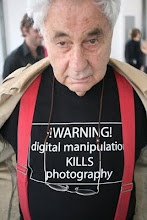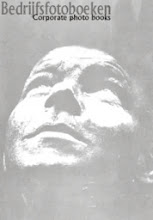In the last years of his life Ed van der Elsken worked on what should have been his audiovisual magnum opus: Tokyo Symphony. The installation was meant to be his homage to Japan – a land that had embraced him personally as well as as a photographer and author.
The installation was never finished due to his early death at age 60. It was thought that the collection of 1,600 images, which is currently stored at the Nederlands Fotomuseum in Rotterdam, was all that remained of this ambitious project. In 2007, researcher Frank Ortmanns discovered five audiotapes belonging to the project. Fascinated by this missing piece of the puzzle, Ortmanns approached Paradox to discuss the possibility of posthumously realizing Tokyo Symphony. Taking into account Van der Elsken’s fascination with AV technology, it was concluded that a contemporary approach to this installation would be most appropriate. In other words: to make an installation as if Van der Elsken were still alive.
The immersive installation based on hundreds of unknown colour slides confronts the viewer with various traditional as well as contemporary and little known aspects of Tokyo: from demonstrations in Shibuya to weddings and memorial celebrations, from girls wrestling and karaoke in Harajuku to the Tsukiji fish market. Van der Elsken switches constantly from intimate portraits to lively street scenes. The spatial multi-screen design of the installation, which is accompanied by a soundtrack based on his original recordings, adds to the dynamic experience of the strange mixture of tradition and modernity that characterises the metropolis of Tokyo. Through the harmonic as well as disharmonic interplay of various audiovisual elements, the installation can be seen as a true modern symphony about urbanism and eastern culture – a symphony that reflects the notion of the all absorbing and omnipresent urban environment.
Ed van der Elsken´s photographs are represented worldwide in the collections of several renowned institutions including the Stedelijk Museum (Amsterdam), the Chicago Art Institute, the Kawasaki Modern Art Museum, the Special Collections Department of the University Leiden and the Museum of Modern Art (New York).
Ed van der Elsken and Eikoh Hosoe: A 30-Year Dialogue by
A year ago in this blog, Matthew Carson highlighted some of the lesser-known classics in the ICP Library collection. One of the books he wrote about was Ed van der Elsken’s Sweet Life (1966). As one of my all-time favorite photobooks, Sweet Life is an incredibly beautiful collection of rich inky high contrast gravure images taken in 1959-61 during van der Elsken’s 14-month journey around the world. It is also an invaluable resource for drawing attention to van der Elsken’s role as a “photographer’s photographer” – a visionary whose raw cinematic stream-of-consciousness aesthetic found only a limited following during his lifetime, yet is now cited for presaging the contemporary diarist work of photographers such as Nan Goldin. Travelling with his wife Gerda van der Veen to West Africa, the Malay Peninsula, the Philippines, Hong Kong, Japan, the United States and Mexico, Sweet Life also documents van der Elsken’s initial photographic exchange in what would become a 30-year ongoing relationship with Japan and the postwar Japanese photographic community. Read for more ...
Even before his 1956 breakthrough with Love on the Left Bank, Van der Elsken attracted attention in international exhibitions such as Edward Steichen’s The Family of Man (1955). Further important exhibitions followed, such as Sweet Life (Amsterdam, 1968), Masters of European Photography (London, 1973), Van der Elsken´s Amsterdam (Amsterdam, 1979), L´Amour à Saint Germain des Prés (Tokyo, 1986) and De ontdekking van Japan 1961-1988 (Amsterdam, 1988/1989). Also posthumously: Once Upon a Time (Amsterdam /Tokyo, 1991), Long Live Me! (Paris /Amsterdam /Porto /Modena /Antwerp, 1996 - 2006), and Documenta X (Kassel, 1997). His most influential photo books include Een liefdesgeschiedenis in Saint Germain des Prés(1956), Bagara (1958), Jazz (1958), Sweet Life (1966), Amsterdam! (1979), De ontdekking van Japan (1988) and Once Upon a Time (1991).
























Geen opmerkingen:
Een reactie posten